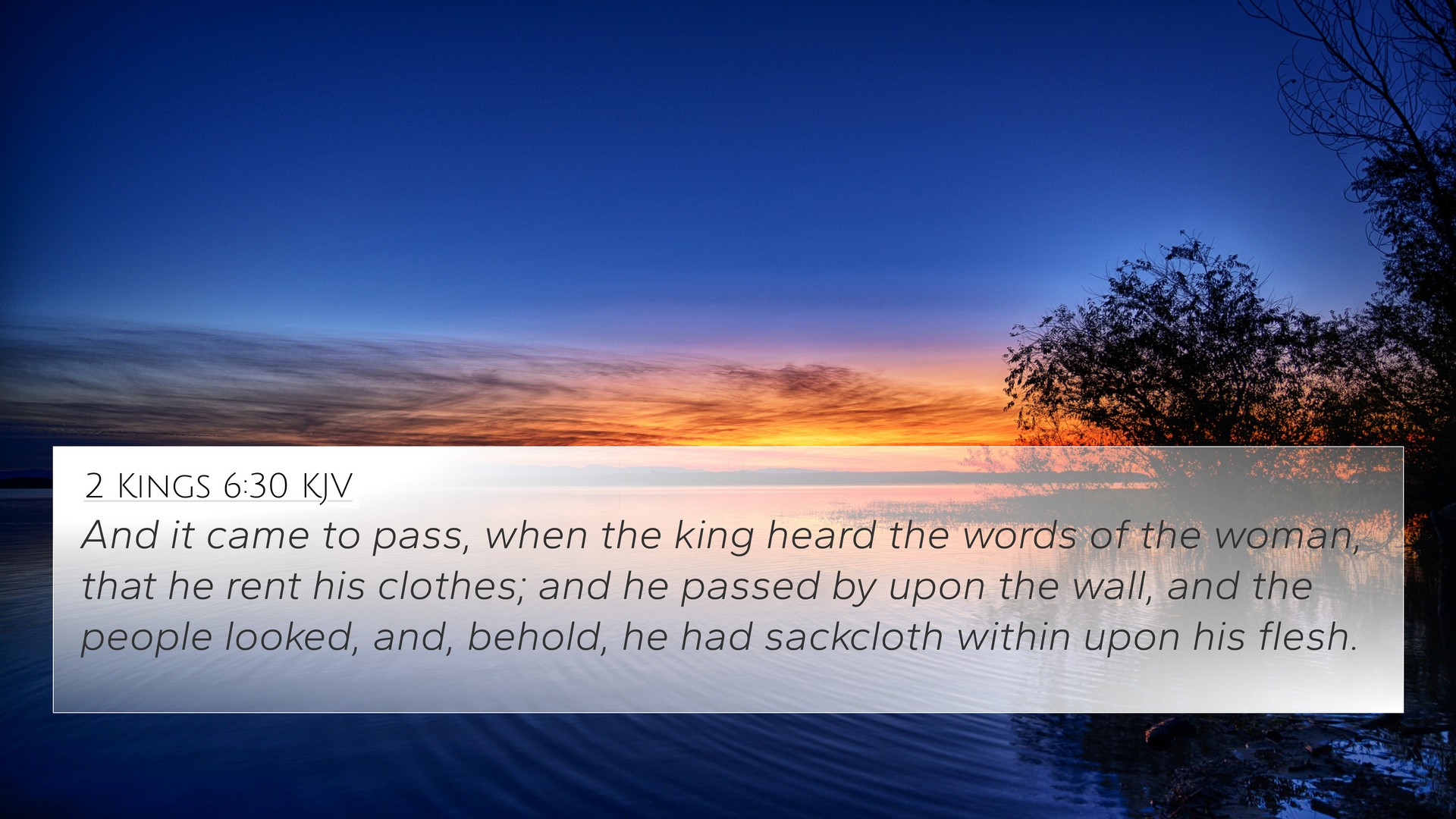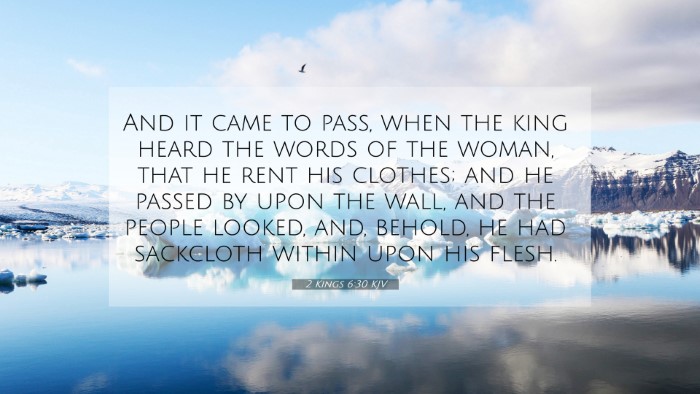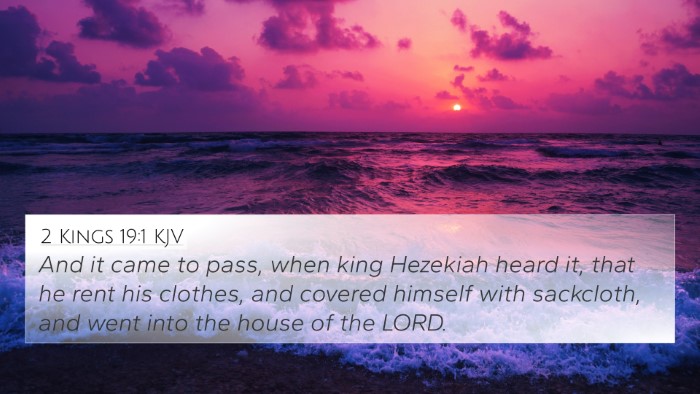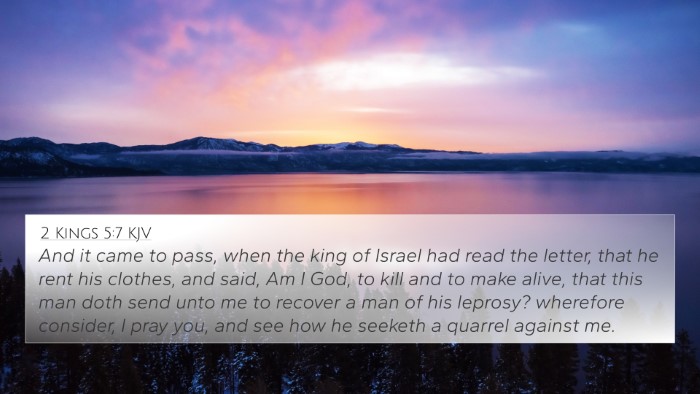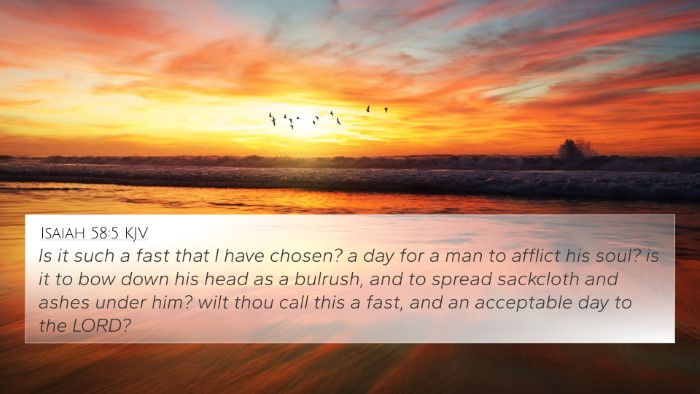Understanding 2 Kings 6:30
Verse: 2 Kings 6:30 - "And it came to pass, when the king heard the words of the woman, that he rent his clothes; and he passed by upon the wall, and the people looked, and, behold, he had sackcloth within upon his flesh."
Overview
The context of this verse occurs during a time of severe famine in Samaria. The king is brought to a state of distress upon hearing a woman's lament, highlighting the dire situation faced by the people. This scene underscores themes of desperation and hopelessness as well as the king’s reaction to the suffering of his subjects.
Commentary Insights
This passage features notable insights from several esteemed public domain commentaries:
-
Matthew Henry:
Henry notes the emotional and spiritual turmoil within the king, who rends his clothes as a sign of grief and distress. This act symbolizes his recognition of the severity of the famine and the burdens placed upon his people. The sackcloth is representative of mourning or repentance, which can also indicate the king's awareness of his shortcomings in delivering his people from suffering.
-
Albert Barnes:
Barnes emphasizes the symbolism of sackcloth as a traditional garment of mourning, indicating the king's sense of failure and impending judgment. The act of rending his clothes was not just a display of sorrow but also an expression of deep concern for the righteous and the innocent suffering in the city. This can lead to reflections on the importance of leadership during crisis situations.
-
Adam Clarke:
Clarke provides a detailed examination of the king's physical actions as illustrating a spiritual and emotional crisis. He suggests that the king’s reaction is not just a personal lament but also a communal acknowledgment of sin and tragedy. Clarke argues that such responses may provoke deeper reflection on the roles of power and authority in caring for the populace.
Thematic Study and Cross-References
To understand 2 Kings 6:30 comprehensively, it is essential to consider related scriptures that provide thematic connections and biblical parallels.
Cross-Referenced Bible Verses
- 2 Kings 6:26-29: Context of the famine and desperate acts of the people, leading to the woman's plea.
- Jeremiah 4:8: Sackcloth as a sign of mourning in prophetic literature.
- Isaiah 15:2: The use of sackcloth in times of distress and mourning.
- Lamentations 3:48-50: The themes of tears and sorrow for the state of the people.
- Matthew 5:4: "Blessed are those who mourn," connecting earthly suffering with divine comfort.
- Luke 19:41-44: Jesus weeping over Jerusalem, linking acts of mourning with concern for a suffering nation.
- James 5:16: Encouragement to confess and lament in the face of community suffering.
- 1 Peter 5:7: Casting anxieties on God, reflecting the need for divine intervention in times of crisis.
- Revelation 21:4: The promise of God wiping every tear, contrasting the sorrow of this world.
Connections Between Bible Verses
When analyzing the connections between these verses, consider how 2 Kings 6:30 acts as a bridge between emotional distress and the hope offered in the promises of God. This inter-biblical dialogue showcases the continuity of suffering and the universal human longing for relief and divine presence.
Practical Applications
For modern readers, this verse can prompt reflections on leadership, compassion, and the role of prayer and repentance in addressing communal crises.
- Leadership: How can leaders today embody concern for their people in times of crisis?
- Mourning: Reflect on the importance of recognizing communal suffering and responding with compassion.
- Repentance: Examine personal and communal sin that may lead to suffering.
Conclusion
2 Kings 6:30 serves as a poignant reminder of the struggles faced by communities and the deep emotional responses that arise in times of distress. Through cross-referencing linked scriptures, we gain a richer understanding of the narrative and its implications for both ancient and contemporary audiences.
